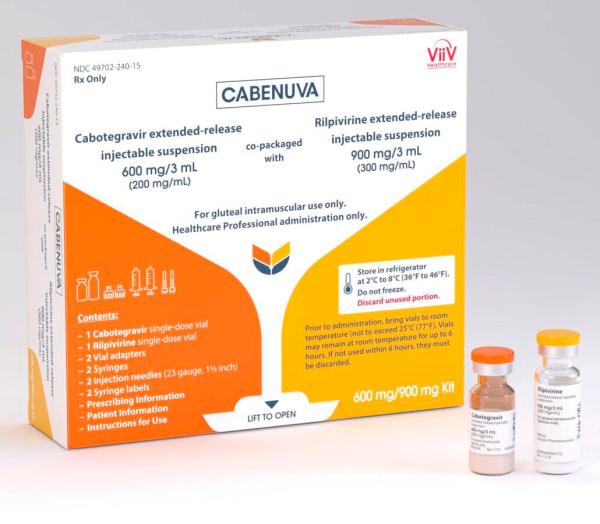Cabenuva Disease Interactions
There are 6 disease interactions with Cabenuva (cabotegravir / rilpivirine).
Cabotegravir (applies to Cabenuva) depression
Moderate Potential Hazard, Moderate plausibility. Applicable conditions: Psychosis
Depressive disorders (including depressed mood, depression, altered mood, mood swings) have been reported with oral cabotegravir. Depressive disorders (including depressed mood, depression, major depression, altered mood, mood swings, dysphoria, negative thoughts, suicidal ideation/attempt) have been reported with IM cabotegravir-rilpivirine or the individual drug products. Patients with severe depressive symptoms should be evaluated promptly. Caution should be used in patients with a history of depression or other psychiatric conditions.
Cabotegravir (applies to Cabenuva) liver impairment
Moderate Potential Hazard, Moderate plausibility. Applicable conditions: Liver Disease
Hepatotoxicity has been reported in patients taking cabotegravir with or without known preexisting hepatic disease or identifiable risk factors. Patients with underlying liver disease or marked transaminase elevations prior to therapy may be at increased risk for worsening or development of transaminase elevations. Monitoring of liver chemistries is recommended and cabotegravir should be discontinued if hepatotoxicity is suspected. Cabotegravir has not been studied in patients with severe liver dysfunction (Child-Pugh C); caution is recommended.
Cabotegravir (applies to Cabenuva) renal impairment
Moderate Potential Hazard, Moderate plausibility. Applicable conditions: Renal Dysfunction
No dose adjustment of IM or oral cabotegravir is required in patients with mild to moderate or mild to severe renal dysfunction, respectively. Cabotegravir has not been studied in patients with ESRD not on dialysis; caution is recommended. IM cabotegravir should be used with caution and with increased monitoring for side effects in patients with severe renal dysfunction or ESRD.
Rilpivirine (applies to Cabenuva) depression
Moderate Potential Hazard, Moderate plausibility. Applicable conditions: Psychosis
Depressive symptoms including suicide ideation and suicide attempts have been reported with the use of rilpivirine. Patients should be monitored for the appearance of these symptoms and should seek medical evaluation immediately if severe depressive symptoms occur. Caution should be used in patients with a history of depression or other psychiatric conditions.
Rilpivirine (applies to Cabenuva) liver impairment
Moderate Potential Hazard, Moderate plausibility. Applicable conditions: Liver Disease
Hepatic adverse events have been reported in patients taking rilpivirine. Patients with underlying hepatitis B or C virus infection or marked transaminase elevations prior to therapy may be at increased risk for worsening or development of transaminase elevations; a few cases of hepatic toxicity have been reported in patients without preexisting hepatic disease or other known risk factors. Appropriate laboratory testing before starting therapy and monitoring for hepatotoxicity during therapy are recommended in patients with underlying hepatic disease (e.g., hepatitis B or C virus infection) or in patients with marked baseline transaminase elevations. Rilpivirine has not been studied in patients with severe liver dysfunction (Child-Pugh C); caution is recommended.
Rilpivirine (applies to Cabenuva) renal impairment
Moderate Potential Hazard, Moderate plausibility. Applicable conditions: Renal Dysfunction
Rilpivirine should be used with caution and with increased monitoring for side effects in patients with severe renal dysfunction or end-stage renal disease, as drug concentrations can be increased due to alteration of drug absorption, distribution, and metabolism secondary to renal dysfunction. No dose adjustment is required in patients with mild or moderate renal dysfunction.
Switch to professional interaction data
Cabenuva drug interactions
There are 464 drug interactions with Cabenuva (cabotegravir / rilpivirine).
Cabenuva alcohol/food interactions
There are 2 alcohol/food interactions with Cabenuva (cabotegravir / rilpivirine).
More about Cabenuva (cabotegravir / rilpivirine)
- Cabenuva consumer information
- Check interactions
- Compare alternatives
- Pricing & coupons
- Reviews (29)
- Drug images
- Side effects
- Dosage information
- During pregnancy
- FDA approval history
- Drug class: antiviral combinations
Related treatment guides
Drug Interaction Classification
| Highly clinically significant. Avoid combinations; the risk of the interaction outweighs the benefit. | |
| Moderately clinically significant. Usually avoid combinations; use it only under special circumstances. | |
| Minimally clinically significant. Minimize risk; assess risk and consider an alternative drug, take steps to circumvent the interaction risk and/or institute a monitoring plan. | |
| No interaction information available. |
See also:
Further information
Always consult your healthcare provider to ensure the information displayed on this page applies to your personal circumstances.


